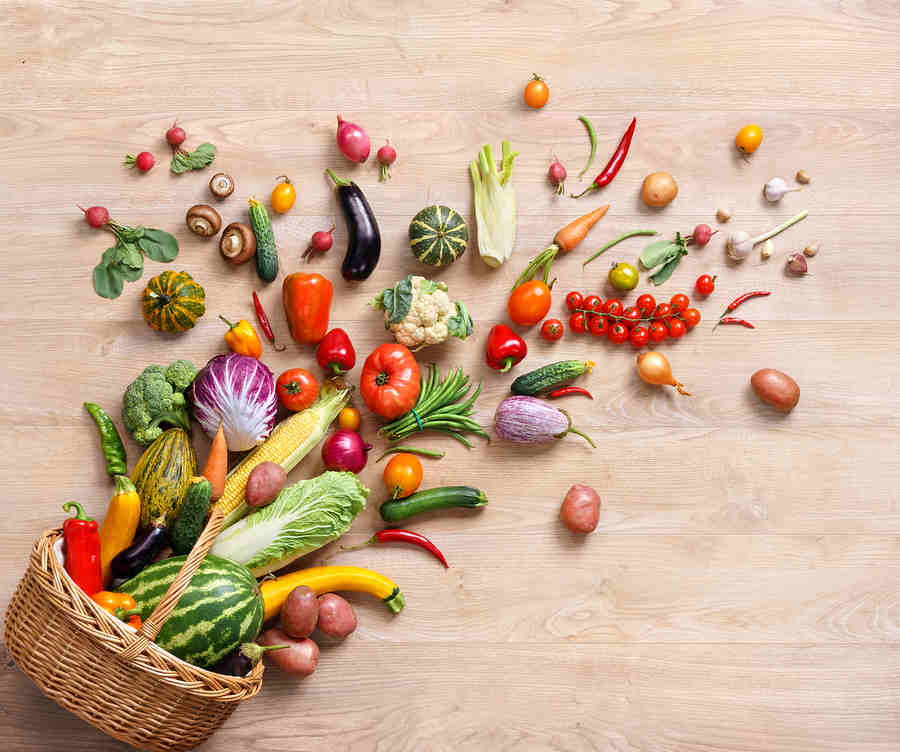
This post may contain affiliate links. We are compensated for referring customers to our affiliate partners.
Dogs are direct descendents of wolves so they are carnivores, right? Right! Regardless of what you’ve been told, dogs are not omnivores, they are in fact carnivores. They are designed to survive off of meat. So then why are there vegetables in dog food? The answer is simple. Even though they do not need vegetables to sustain a healthy life, they can benefit from the nutrients in vegetables. Vegetables provide necessary fiber, carbohydrates for energy, and vitamins and minerals. So regardless of being carnivores, manufacturers will add vegetables to any good dog food to bolster the nutritional value.
How Vegetables Benefit Your Dog
Vegetables have a variety of great benefits for your dog. Here are the vegetables commonly used in dog food and how they can benefit your dog’s health.
Asparagus: Asparagus is loaded with the essential nutrients your dog needs for their overall health. Asparagus contains vitamins A, C, and E which are great for their skin and coat, vitamins B1 and B2 which help give you dog energy, and essential minerals like folate, iron, calcium, copper, manganese, potassium. Asparagus also has a lot of fiber that aids in digestion.
Beets: Beets are usually added to dog food as beet pulp. Beet pulp is a great form of soluble fiber that aids in digestion and relieves constipation. Beets are also rich in antioxidants and contain essential B vitamins that support heart health and tissue growth.
Beans: Beans are especially good for dogs. Dog foods are often made with pinto beans, garbanzo beans, or kidney beans. Beans are very high in fiber and protein. They are also extremely high in vitamin B which helps support energy. Beans are often used as a protein source for dogs with food allergies and sensitive digestion.
Carrots: Carrots are rich in vitamins A, C, D, E, K, B1, and B6. They are especially good for a healthy skin, coat, and eyes. Carrots are also high in complex carbohydrates so they are added to dog foods to provide your dog with lots of energy throughout their active day.
Corn: Corn is a great ingredient full of amino acids that help support muscle growth and a shiny coat. Corn also provides carbohydrates and fiber. However sometimes corn is used as a filler ingredient. So try to only feed your dog foods with whole corn and not corn products like corn gluten meal or corn flour. Further corn syrup is a form of refined sugar which can cause obesity and diabetes. So even though corn is healthy for your dog, many processed corn products are not, so be particularly careful when buying dog food with these ingredients.
Celery: Celery is loaded with vitamins A, B, and C and are great for a healthy heart and cancer prevention. Celery is also a great source of fiber.
Ginger: Ginger is a digestive powerhouse for your dog. It helps with upset stomach, nausea, and even combats motion sickness.
Green Beans: Green beans contain omega-3 fatty acids which are good for your dog’s coat and hearth health. They also have high levels of vitamins A, C, and K, which are great antioxidants and help boost the immune system. Green beans also contain a lot of calcium which helps your dog’s bones and teeth stay strong and healthy.
Kale: Kale is a superfood and is loaded with tons of healthy phytonutrients. Kale has lots of vitamins A, C, and K and is high in copper, potassium, and iron. Kale helps prevent cancer, specifically colon and bladder cancer in dogs. Kale also contains a high amount of lutein which support your dog’s eye health.
Peas: Peas are a great form of novelty protein. They are loaded with fiber and are an excellent source of vitamin K. Peas are often food in dog foods that are designed for dogs with food allergies because they are a great alternative protein.
Potatoes: Potatoes are very nutrient-dense. They contain high amounts of minerals, antioxidants, vitamins B3, B6, and C, flavonoids, and phytochemicals. Potatoes help support your dog’s immune system, heart, and help protect against cancer.
Spinach: Spinach is high in iron which helps dogs build red blood cells and maintain their energy. Spinach is also rich in the antioxidants that help defend your dog against inflammation, cardiovascular disease, and cancer. There is also a lot of protein in spinach.
Soybean: Soybeans are a great source of protein and fiber. They also contain a lot of potassium which helps their muscle development, nervous system, and helps your dog stay hydrated. However, like corn, processed soybeans are often used as fillers or bonding agents. So it is important that you buy dog food that contains whole soybeans rather than soybean hull mill or soybean oil.
Pumpkin: Pumpkin has high amounts of fiber which aids digestion and can help alleviate diarrhea and constipation. It is also loaded with vitamin A which helps them have clear eyes and healthy skin and coat.
Sweet Potatoes: Sweet potatoes are excellent for dogs and are often a main ingredient in good dog food. They are loaded with beta carotene which protects your dog against cancer and heart disease. They also contain high levels of potassium, calcium, manganese, iron, and zinc which help support nervous system function and build strong muscles. Sweet potatoes are also extremely high fiber.
As you can see, even though dogs are carnivores there are a lot of nutritional benefits to adding vegetables to their diet. However, it is important to note that vegetables in dog food is very different than feeding your dogs raw vegetables. Dog foods are designed by veterinarians and dog food nutritionists and have the right balance of these vegetables for your dog. Further many of these vegetables are processed to be easier to digest. So make sure you consult your veterinarian before feeding your dog any raw vegetables.
